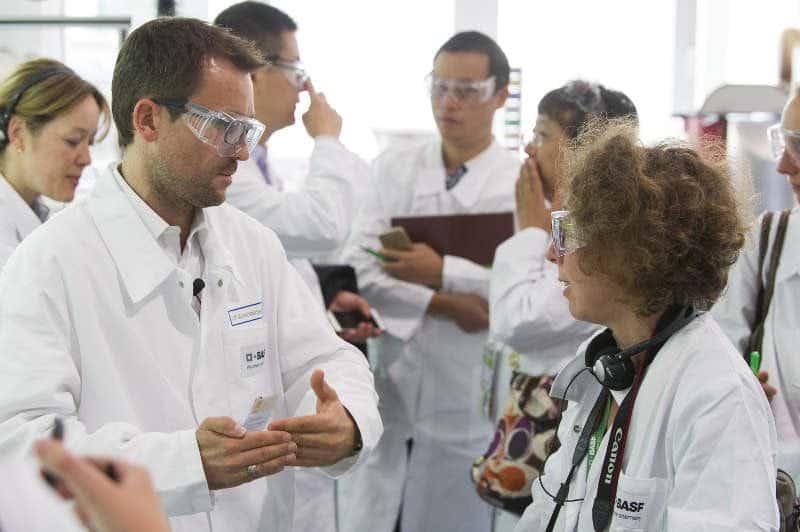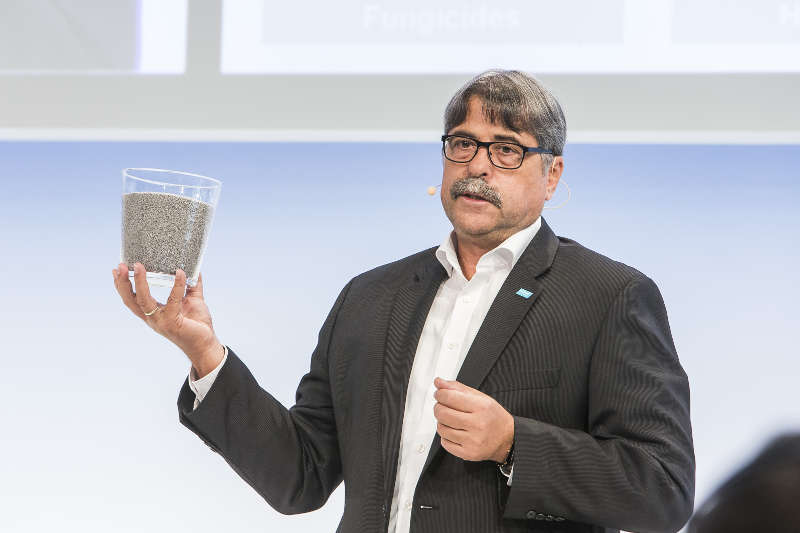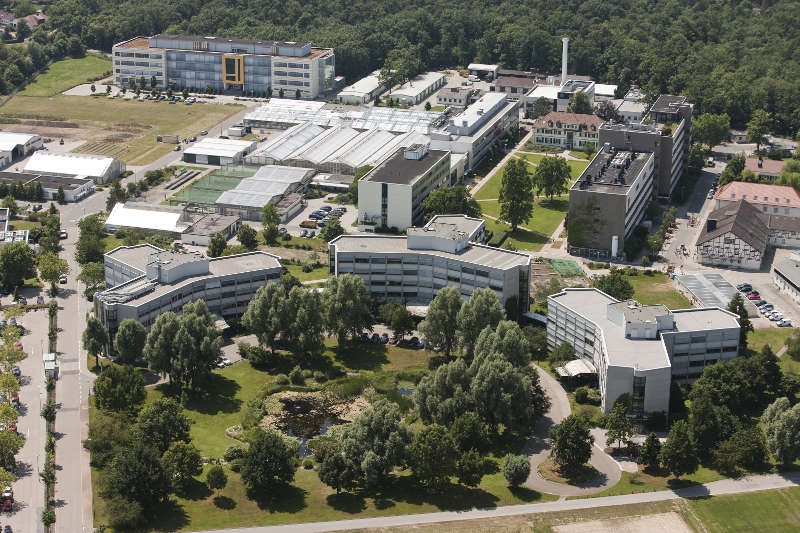Seed World gets an inside look at a new R&D center designed to meet growing demand for solutions beyond classical crop protection.
BASF’s operations in Limburgerhof, Germany, just got even more substantial with the addition of a new research and development facility for biological crop protection and seed solutions.
The new R&D center will boost BASF’s global network of R&D sites as well as trial centers in all regions that are dedicated to developing seed solutions and biologicals-based crop protection, including Brazil, Argentina, France, U.K., South Africa, China, Australia, U.S. and Canada.
Seed World was given a firsthand look at the new center as part of BASF’s 2016 Global Press Conference held Sept. 5-6. Eighty-one journalists from 25 countries were in attendance at the event, held in the heart of the company’s operations in Ludwigshafen and surrounding region, including Limburgerhof.
The event highlighted how crucial seeds are for one of the world’s largest chemistry giants. Held just days before the merger of Monsanto and Bayer was announced on Sept. 14, the global press conference allowed BASF to showcase its business plans and some of the people responsible for shaping those plans.
“Our investment in this expanded capacity is a step forward to unlocking the agricultural potential in seeds and crops in different and untapped ways,” said Philipp Rosendorfer, vice president R&D Functional Crop Care for BASF’s Crop Protection division.
The research on biological solutions, which consists of naturally occurring organisms or extracts thereof, provides great opportunities to complement BASF’s chemical crop protection, he said. Moreover, the combination between chemistry and biology generates a new range of pioneering solutions for seed treatment.
“With BASF’s unique skills in research and state-of-the art formulations, we are one of a few companies that can provide a seed treatment with a mixture of both biological and chemical compounds. This means farmers can have a well-protected and strengthened crop right from the beginning of its life.”
Ulf Schlotterbeck has been working with BASF Seed Solutions for 10 years now. Now the head for BASF Seed Solutions Technology, he notes that BASF is the only major crop protection company not offering seeds. That allows it to concentrate fully on seed solutions, and not seeds themselves.
“We are dealing with the application of the products to the seeds,” he says, and notes this gives the company a unique edge in being able to concentrate on seed solutions for growers.
“Seed treatment is one of the most important crop protection measures you can have, because you apply the active ingredient right where it’s needed — on the surface of the seed. It’s ecologically and economically a very attractive crop protection measure.”

Shaping Itself for the Future
With an area of approximately 10 square kilometres, BASF’s Ludwigshafen Verbund site is the world’s largest integrated chemical complex. As the headquarters of BASF, it is also the cradle of the Verbund concept, where production facilities, energy flows and logistics are networked together intelligently in order to utilise resources as efficiently as possible.
The company has a long history at its Ludwigshafen site in southwestern Germany, now employing a workforce of over 39,000. It also plays an indispensable role in the company history books.
That rich history formed the backdrop for the 2016 Global Press Conference. As a company with humble beginnings in Ludwigshafen that has grown into a global chemistry giant, it was fitting that Crop Protection Division president Markus Heldt noted that the company is, “Willing and ready to invest to grow its business globally.”
He’s worked in the industry for 35 years and has witnessed a plethora of changes in that time, including consolidation that’s served to change the landscape of the global ag business.
That landscape has changed even more now that Bayer announced its buyout of Monsanto for $66 billion. The combined agriculture business will have its global Seeds & Traits and North American commercial headquarters in St. Louis, Missouri, its global Crop Protection and overall Crop Science headquarters in Monheim, Germany, and an important presence in Durham, North Carolina, as well as many other locations throughout the U.S. and around the world.
According to Heldt, BASF is more than confident in its ability to cope with the changing industry landscape and be agile and ready to adapt to shifting times. It’s been doing so since its inception.
The story is long and detailed, but goes like this. Entrepreneur Friedrich Engelhorn, who owned a coal gas company in the nearby city of Mannheim, very quickly recognizes the opportunities for coal tar, a byproduct of his company’s business. But he has bigger ideas — a company that spans the entire production process, from raw materials and auxiliaries through precursors and intermediates to dyes.
In April of 1865, Engelhorn turns his idea into reality. He founds a stock corporation in Mannheim under the name Badische Anilin- & Sodafabrik. After the planned acquisition of a site in Mannheim falls through, the manufacturing facilities are built on the opposite side of the Rhine River in Ludwigshafen, then part of the kingdom of Bavaria. BASF is born.
BASF has always been proud of its ability to succeed no matter the circumstances, and Heldt says this ability will help carry it into the future.
“We believe size on its own — or just bundling technologies of seed and chemistry, for example — is not a recipe for success,” Heldt said. “Farmers want freedom to choose, and that’s why we’re convinced they enjoy having access to different suppliers, and not just three or four on a global scale. We see our position as robust and strong. We have a strong local footprint in all markets and an outstanding pipeline.”
BASF’s current crop protection pipeline of innovations has new product candidates from all indications in advanced phases. The company estimates that peak sales from crop protection products launched between 2015 and 2025 will total 3 billion euros.
One example is the company’s latest fungicide, Revysol. Currently under registration by European authorities, this compound has shown outstanding biological performance against a range of pathogens, as well as a favourable regulatory profile, according to the company.
BASF strives to complement its traditional crop protection offerings to provide farmers with new technologies, like its new digital farming platform Maglis. According to Matthias Nachtmann, team lead digital farming for BASF, Maglis is BASF’s most significant accomplishment in the area of digital farming.
Launched at the beginning of 2016, Maglis helps farmers to gather, interpret, and monitor a range of crop-related data that will result in better decision-making on how to grow and market crops.

Adding Value
According to Heldt, seed solutions form a major strategic pillar for BASF.
“Everything around seed — protecting seed and improving the value of seed — is very important,” he said, including biological seed treatment products.
Heldt holds up a small jar containing about one kilogram of BASF’s Nodulator product, a highly efficient active strain of rhizobium, selected to perform on soybean seed. It contains 80 billion rhizobia.
“That one kilogram of product treats 1,000 kilograms of soybean seed,” he said. “It shows how our biological products complement conventional chemistry and add value for customers and our portfolio.”
Developing solutions derived from the combination of chemical and biological expertise is another important focus of BASF’s growth strategy. The company is one of the few that can provide, for example, a seed treatment product with a mixture of both biological and chemical compounds. The investment in biological solutions, which consist of naturally occurring organisms or plant extracts, will yield a number of benefits for farmers, including the availability of further modes of action that can lead to improved resistance management.
The recent opening of a new R&D center for biologicals and seed solutions at the division’s headquarters in Limburgerhof will further accelerate the development of new products in these areas.
For the remainder of 2016, BASF expects the agricultural market to remain volatile and the business environment to be challenging. Based on current developments, the financial goal for the Crop Protection division in 2016 is to strive for the same profitability level it reached in 2015.
“Our sales force will be close to our customers. We will intensify our sales efforts, supported by the launch of new products and formulations,” said BASF board member Harald Schwager, who opened the 2016 Global Press Conference.
“Changes lead to new opportunities for business growth and differentiation. We can look back with pride on BASF’s 100-year legacy of accomplishments in bringing breakthrough solutions for farmers to the market. Even more important is to look forward and to be part of an industry-leading team that helps shape and improve the future of modern agriculture.”











